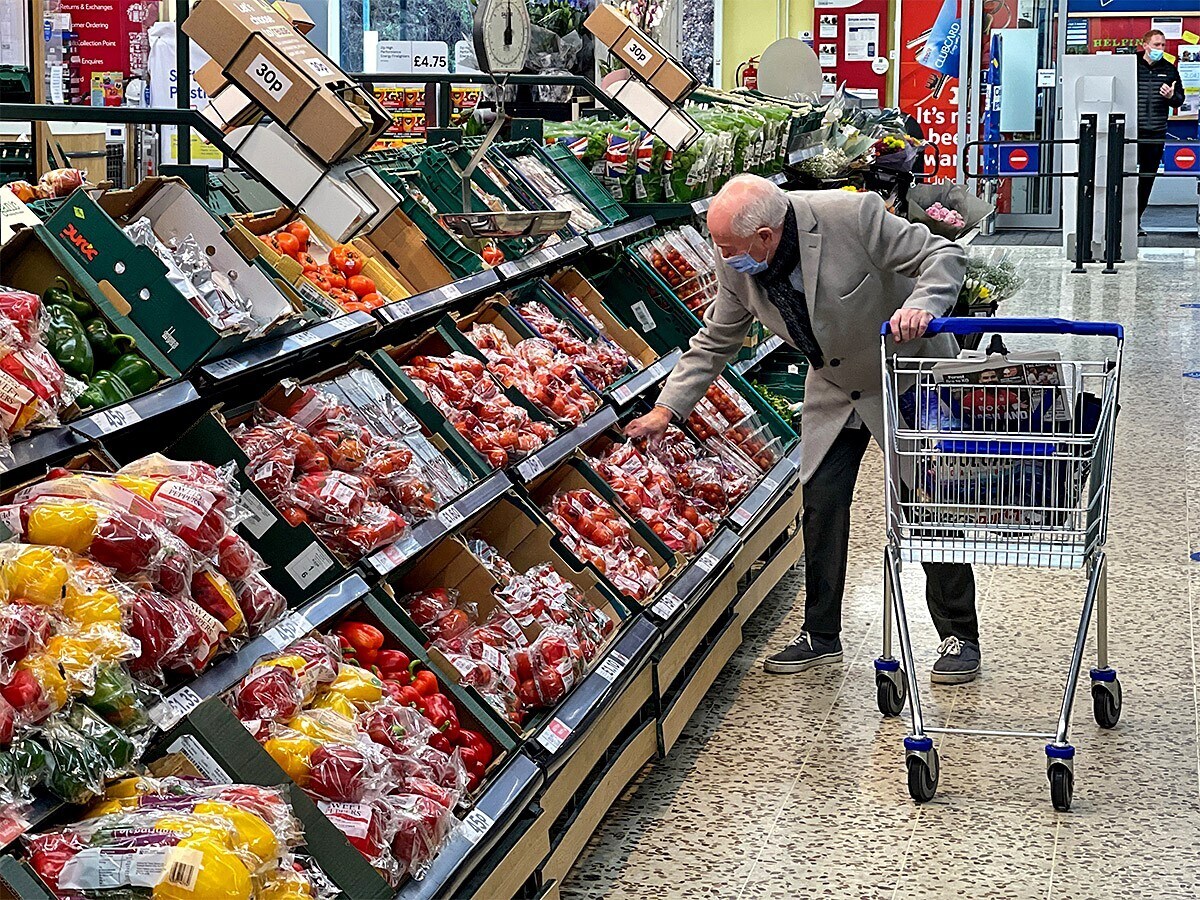The Tesco share price that reeled under the effects of the Covid lockdowns, could begin a recovery after full-year earnings show a sharp turnaround and the brand consolidates its image as offering ‘value’ products heading into the cost-of-living crisis.
Supermarket Tesco [TSCO.L] is expected to report a 6% hike in revenues and an 80% leap in earnings per share when it releases its annual results on 13 April, as people return to stores after pandemic related lockdowns.
According to a City Index report the group is tipped to report revenues of £61.2bn and an adjusted EPS of 21.78p. In addition, its adjusted operating profit is set to climb by over 54% to £2.8bn.
Tesco’s had earlier said sales over the Christmas period proved to be “exceptional”.
Its profitability is also likely to rise due to reduced Covid-19 linked costs, such as higher staffing for online deliveries during lockdown and to cover more sick or isolation leave. The comparable figures from 2020 with subdued revenue and higher costs make for a starker gain in 2021.
Inflation challenge
Soaring inflation and costs are a challenge for any retailer as hard-pressed customers face the choice of buying less or trading down to less expensive rivals.
However, AJ Bell financial analyst Danni Hewson said, Tesco may be more protected than its peers. The group has maintained a 27.4% lead in market share over the last 12 months, while rivals Sainsbury’s [SBRY.L], Asda and Morrisons have all lost ground to discounters Aldi and Lidl, and online grocery specialist Ocado [OCDO.L].
“Tesco may have a bit of pricing power. At a time when inflation is a key concern, this could be a useful part of Tesco’s armoury when it comes to driving profits and cashflow, and protecting profit margins,” Hewson said.
In short, Tesco has more wriggle room to cut prices and keep or gain customers than its peers in their battle with the discounters.
As pointed out by City Index, tight financial times also lead to more shoppers looking for cheaper own-brand ranges – again something Tesco has been growing in recent years.
It also highlighted the success of Tesco’s wholesale business Booker Group, which has fared well from the post-lockdown reopening of hospitality sites and supplying convenience store groups such as Premier and Londis. “This could be key in helping Tesco offset any tightening of demand from the core supermarket business as people tighten their purse strings this year,” City Index said.
Doubling down on value
In its third quarter Tesco said UK same-store sales were up 2.3% on a one-year basis and by 8.2% on a two-year comparison. Group retail sales were up 2.4%. Tesco Bank sales were up 33.6%.
“Despite growing cost pressures and supply chain challenges in the industry, we continued to invest to protect availability, doubled down on our commitment to deliver great value and offered our strongest ever festive range,” CEO Ken Murphy said.
The Tesco share price rose 5% over the two weeks following the announcement to hit 303p. However, since then – given inflationary worries – it has dropped 10% to 271.3p at the close on 8 April.
Over the last 12 months the Tesco stock has risen 17%, compared with the a flat Sainsbury’s share price at around 246p, and Ocado, which is down 42% as the pandemic eases.
Pricing pressures
Since the beginning of 2022 the supermarket, like its peers, may see a dent in performance given the rising cost-of-living crisis, with inflation and the Russia Ukraine war pushing up energy bills and petrol prices.
Tesco recently upped the wages of its shop staff and warehouse workers to help them cope with the rise in the cost of living. It may also face pressure to do the same with its product prices – though down rather than up – in the weeks ahead.
Tesco recently announced a 20% leap in the price it pays fresh milk suppliers to compensate for rising fertiliser and feed costs, reported the City Index. Commentary on whether the company plans to absorb these costs can steer the course of its share price.
Analysts will also be looking for Tesco’s experience of dealing with supply chain bottlenecks.
Matt Britzman, equity analyst at Hargreaves Lansdown, says online competition will be another area of focus.
The call in the Tesco stock is bullish with a consensus ‘buy’ rating on MarketScreener and a 319p target price.
Disclaimer Past performance is not a reliable indicator of future results.
CMC Markets is an execution-only service provider. The material (whether or not it states any opinions) is for general information purposes only, and does not take into account your personal circumstances or objectives. Nothing in this material is (or should be considered to be) financial, investment or other advice on which reliance should be placed. No opinion given in the material constitutes a recommendation by CMC Markets or the author that any particular investment, security, transaction or investment strategy is suitable for any specific person.
The material has not been prepared in accordance with legal requirements designed to promote the independence of investment research. Although we are not specifically prevented from dealing before providing this material, we do not seek to take advantage of the material prior to its dissemination.
CMC Markets does not endorse or offer opinion on the trading strategies used by the author. Their trading strategies do not guarantee any return and CMC Markets shall not be held responsible for any loss that you may incur, either directly or indirectly, arising from any investment based on any information contained herein.
*Tax treatment depends on individual circumstances and can change or may differ in a jurisdiction other than the UK.
Continue reading for FREE
- Includes free newsletter updates, unsubscribe anytime. Privacy policy





